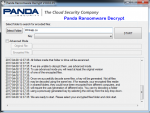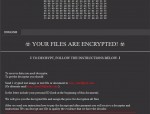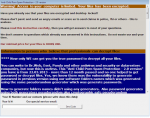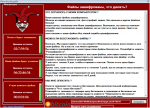Erase Oni Ransomware
Oni Ransomware is file-encrypting ransomware. File-encrypting malware normally arrives in devices via spam emails or malicious downloads, and this one likely used those very ways. File-encrypting malware is believed to be a very harmful malware since it encrypts data, and asks for payment in exchange for getting them back. Sometimes, damaging software researchers are able to make a free decryption key or if you have backup, you might recover your files from there. But otherwise, there is limited chance you will restore your data. Some could think paying the ransom is the solution, but we need to notify you that it does not ensure data decryption. There are plenty of of cases when file-encoding malware developers just take the money and leave files locked. Since paying isn't a reliable file recovery way, you need to simply terminate Oni Ransomware. Read more...How to uninstall Panda ransomware
 Panda ransomware is a ransomware type of virus that hazardous piece of malware, known as ransomware, that can encode your files. Ransomware is a very alarming contamination as it will encode your files and request money in exchange for a decoding method. We need to warn you that usually, users do not recover their files. You may get corrupt your operating system with file-encrypting malware if you are not vigilant when opening email attachments or if you fall for a malicious download. These kinds of things are what professionals are warning users about regularly. People are asked to pay a ransom if they are infected and that is the last thing they should do. Crooks can just take your money and not decode your data. Do not pay attention to the demands, and abolish Panda ransomware.
Read more...
Panda ransomware is a ransomware type of virus that hazardous piece of malware, known as ransomware, that can encode your files. Ransomware is a very alarming contamination as it will encode your files and request money in exchange for a decoding method. We need to warn you that usually, users do not recover their files. You may get corrupt your operating system with file-encrypting malware if you are not vigilant when opening email attachments or if you fall for a malicious download. These kinds of things are what professionals are warning users about regularly. People are asked to pay a ransom if they are infected and that is the last thing they should do. Crooks can just take your money and not decode your data. Do not pay attention to the demands, and abolish Panda ransomware.
Read more...
Erase French ransomware
 French ransomware will encrypt your files the minute it invades your system since it's malevolent file-encrypting software. Ransomware is a very dangerous threat as it will encode your files and demand money in exchange for a decryption key. Regrettably, pretty often, users end up not getting their files back. There are a couple of methods you may infect your computer with ransomware, the most likely one being via malevolent email attachments or deceiving downloads. This is why analysts have been cautioning users for a very long time that they ought to be very vigilant when using the Internet. When users bump into ransomware, they feel compelled to pay the ransom, which they should doubtlessly not do, in our opinion. Malware makers are criminals who aren't bound to decode your data even if you pay, so we cannot recommend it. We encourage you to remove French ransomware, and ignore the demands.
Read more...
French ransomware will encrypt your files the minute it invades your system since it's malevolent file-encrypting software. Ransomware is a very dangerous threat as it will encode your files and demand money in exchange for a decryption key. Regrettably, pretty often, users end up not getting their files back. There are a couple of methods you may infect your computer with ransomware, the most likely one being via malevolent email attachments or deceiving downloads. This is why analysts have been cautioning users for a very long time that they ought to be very vigilant when using the Internet. When users bump into ransomware, they feel compelled to pay the ransom, which they should doubtlessly not do, in our opinion. Malware makers are criminals who aren't bound to decode your data even if you pay, so we cannot recommend it. We encourage you to remove French ransomware, and ignore the demands.
Read more...
Remove CorruptCrypt ransomware
 CorruptCrypt ransomware can be the file-encoding malware responsible for your file encoding. Ransomware generally enters systems through spam emails or fake downloads, and it is pretty possible that this one uses those very methods. File-encrypting malware is believed to be a highly dangerous malware since it encodes data, and asks that you pay to get them back. If back up is something you frequently do, or if malware specialists make a free decryptor, file-recovery should not be hard. But otherwise, there is limited chance you will restore your data. Paying the ransom does not mean you will get your files back so bear that in mind if you pick to pay. Hackers already locked your data, what's preventing them from becoming even more nasty by not decrypting your data after payment. Since payment could not be the most reliable option, you need to just abolish CorruptCrypt ransomware.
Read more...
CorruptCrypt ransomware can be the file-encoding malware responsible for your file encoding. Ransomware generally enters systems through spam emails or fake downloads, and it is pretty possible that this one uses those very methods. File-encrypting malware is believed to be a highly dangerous malware since it encodes data, and asks that you pay to get them back. If back up is something you frequently do, or if malware specialists make a free decryptor, file-recovery should not be hard. But otherwise, there is limited chance you will restore your data. Paying the ransom does not mean you will get your files back so bear that in mind if you pick to pay. Hackers already locked your data, what's preventing them from becoming even more nasty by not decrypting your data after payment. Since payment could not be the most reliable option, you need to just abolish CorruptCrypt ransomware.
Read more...
Delete ACCDFISA v2.0 Ransomware
 ACCDFISA v2.0 Ransomware is a piece of malware that is more commonly referred to as ransomware because it takes your files hostage. The preferred spread way by ransomware is spam emails and bogus downloads. File-encrypting malicious software is highly dangerous piece of malware since it encodes data, and demands for payment in exchange for getting them back. If back up is something you frequently do, or if malicious program specialists develop a free decryptor, file-recovery would not be hard. Other than that, data recovery could be impossible. By paying the ransom, you might not necessarily get your files back so keep that in mind if you choose to pay. There are many of cases when file-encrypting malicious software authors just take the money and leave the files as they are, encoded. It's your choice if you want to pay but giving them money when you aren't even sure you will get something out of it is quite risky, thereby you should erase ACCDFISA v2.0 Ransomware instead.
Read more...
ACCDFISA v2.0 Ransomware is a piece of malware that is more commonly referred to as ransomware because it takes your files hostage. The preferred spread way by ransomware is spam emails and bogus downloads. File-encrypting malicious software is highly dangerous piece of malware since it encodes data, and demands for payment in exchange for getting them back. If back up is something you frequently do, or if malicious program specialists develop a free decryptor, file-recovery would not be hard. Other than that, data recovery could be impossible. By paying the ransom, you might not necessarily get your files back so keep that in mind if you choose to pay. There are many of cases when file-encrypting malicious software authors just take the money and leave the files as they are, encoded. It's your choice if you want to pay but giving them money when you aren't even sure you will get something out of it is quite risky, thereby you should erase ACCDFISA v2.0 Ransomware instead.
Read more...
How to remove Sad Ransomware
 Sad Ransomware might be the file-encrypting malicious software that encoded your files. Fake downloads and spam emails are the most probable way you acquired the threat. File-encoding malicious software will encode your files immediately upon entry and demand money, which is why it's believed to be a highly damaging contamination. If if you regularly backup your files, or if damaging software analysts release a free decryptor, file-recovery would not be difficult. But otherwise, there is a big chance you will lose your files. Paying the ransom won't necessarily result in file decryption so keep that in mind if you are considering paying. There are of cases when file-encrypting malicious software authors just take the money and leave files encoded. We would encourage that you uninstall Sad Ransomware instead of complying with the requests.
Read more...
Sad Ransomware might be the file-encrypting malicious software that encoded your files. Fake downloads and spam emails are the most probable way you acquired the threat. File-encoding malicious software will encode your files immediately upon entry and demand money, which is why it's believed to be a highly damaging contamination. If if you regularly backup your files, or if damaging software analysts release a free decryptor, file-recovery would not be difficult. But otherwise, there is a big chance you will lose your files. Paying the ransom won't necessarily result in file decryption so keep that in mind if you are considering paying. There are of cases when file-encrypting malicious software authors just take the money and leave files encoded. We would encourage that you uninstall Sad Ransomware instead of complying with the requests.
Read more...
Eliminate WannaSmile ransomware
 WannaSmile ransomware can be the ransomware responsible for your file encryption. The most probable way you got the file-encrypting malicious software was through spam emails and fake downloads. Ransomware is regarded as one of the most harmful malware you could get since it encrypts files, and requests for money in exchange for decrypting them. If if you regularly backup your data, or if damaging software analysts release a free decryptor, file-recovery should not be hard. By not backing up your files frequently, you can end up losing your data permanently as file recovery using other methods isn't always possible. Paying for the presented decryptor won't necessarily lead to data decoding so take that into account if you select to pay. Hackers already encrypted your files, what's stopping them from being even more nasty by not unlocking your files after you pay. We would encourage that you delete WannaSmile ransomware instead of complying with the requests.
Read more...
WannaSmile ransomware can be the ransomware responsible for your file encryption. The most probable way you got the file-encrypting malicious software was through spam emails and fake downloads. Ransomware is regarded as one of the most harmful malware you could get since it encrypts files, and requests for money in exchange for decrypting them. If if you regularly backup your data, or if damaging software analysts release a free decryptor, file-recovery should not be hard. By not backing up your files frequently, you can end up losing your data permanently as file recovery using other methods isn't always possible. Paying for the presented decryptor won't necessarily lead to data decoding so take that into account if you select to pay. Hackers already encrypted your files, what's stopping them from being even more nasty by not unlocking your files after you pay. We would encourage that you delete WannaSmile ransomware instead of complying with the requests.
Read more...
Uninstall WannaDie ransomware
 WannaDie ransomware will encrypt your files the second it enters your OS since it's file-encoding malware. Ransomware viruses are extremely dangerous computer threats as they ask money in exchange for file recovery. Unfortunately, oftentimes, users are left with useless files. You probably opened a infected email attachment or fell for a bogus download recently and that is how you got contaminated. Researchers have been alerting users about the disastrous consequences that careless Internet use may cause but ransomware contaminations are still very commonplace. When your data gets encoded by ransomware, you are asked to pay a ransom but it's uncertain that you will get your files back this way. Crooks might just take your money and not decrypt your files. Do not comply with the demands, and just eliminate WannaDie ransomware.
Read more...
WannaDie ransomware will encrypt your files the second it enters your OS since it's file-encoding malware. Ransomware viruses are extremely dangerous computer threats as they ask money in exchange for file recovery. Unfortunately, oftentimes, users are left with useless files. You probably opened a infected email attachment or fell for a bogus download recently and that is how you got contaminated. Researchers have been alerting users about the disastrous consequences that careless Internet use may cause but ransomware contaminations are still very commonplace. When your data gets encoded by ransomware, you are asked to pay a ransom but it's uncertain that you will get your files back this way. Crooks might just take your money and not decrypt your files. Do not comply with the demands, and just eliminate WannaDie ransomware.
Read more...
Eliminate BASS-FES ransomware
 BASS-FES ransomware is a file-encoding ransomware kind of virus that hazardous piece of damaging software, known as ransomware, that is capable of encoding your files. File-encoding malware viruses are one of the most dangerous contaminations out there as they demand money in exchange for file recovery. We ought to alert you that oftentimes, users don't restore their files. It is quite easy to to infect your PC, all you really need to do is open a dangerous email attachment or fall for a deceiving download. This is why you need to follow the input of professionals when they alert you about these things. Upon infection, you are demanded to pay for a decryption utility but it's dubious that you will get your files back this way. It would actually be shocking if you got your data decoded after payment, since cyber criminals don't feel compelled to help you. We recommend you to delete BASS-FES ransomware, rather than complying with the demands.
Read more...
BASS-FES ransomware is a file-encoding ransomware kind of virus that hazardous piece of damaging software, known as ransomware, that is capable of encoding your files. File-encoding malware viruses are one of the most dangerous contaminations out there as they demand money in exchange for file recovery. We ought to alert you that oftentimes, users don't restore their files. It is quite easy to to infect your PC, all you really need to do is open a dangerous email attachment or fall for a deceiving download. This is why you need to follow the input of professionals when they alert you about these things. Upon infection, you are demanded to pay for a decryption utility but it's dubious that you will get your files back this way. It would actually be shocking if you got your data decoded after payment, since cyber criminals don't feel compelled to help you. We recommend you to delete BASS-FES ransomware, rather than complying with the demands.
Read more...
Get rid of Pennywise Ransomware
 Pennywise Ransomware is is a file-encrypting kind of malware. Bogus downloads and spam emails are widely used to distribute the ransomware. File-encoding malware is considered to be a highly damaging malicious program because it encrypts files, and asks for payment in exchange for recovering them. If file-encoding malicious software analysts manage to crack the ransomware, they may develop a free decoding tool, or if you have backup, you may easily recover your files. But otherwise, there is limited possibility you will restore your files. Paying the ransom doesn't mean you will get your files back so take that into account if you opt to pay. Remember who you are dealing with, cyber criminals might not feel compelled to help you with anything. Instead of paying, you need to uninstall Pennywise Ransomware from your OS.
Read more...
Pennywise Ransomware is is a file-encrypting kind of malware. Bogus downloads and spam emails are widely used to distribute the ransomware. File-encoding malware is considered to be a highly damaging malicious program because it encrypts files, and asks for payment in exchange for recovering them. If file-encoding malicious software analysts manage to crack the ransomware, they may develop a free decoding tool, or if you have backup, you may easily recover your files. But otherwise, there is limited possibility you will restore your files. Paying the ransom doesn't mean you will get your files back so take that into account if you opt to pay. Remember who you are dealing with, cyber criminals might not feel compelled to help you with anything. Instead of paying, you need to uninstall Pennywise Ransomware from your OS.
Read more...